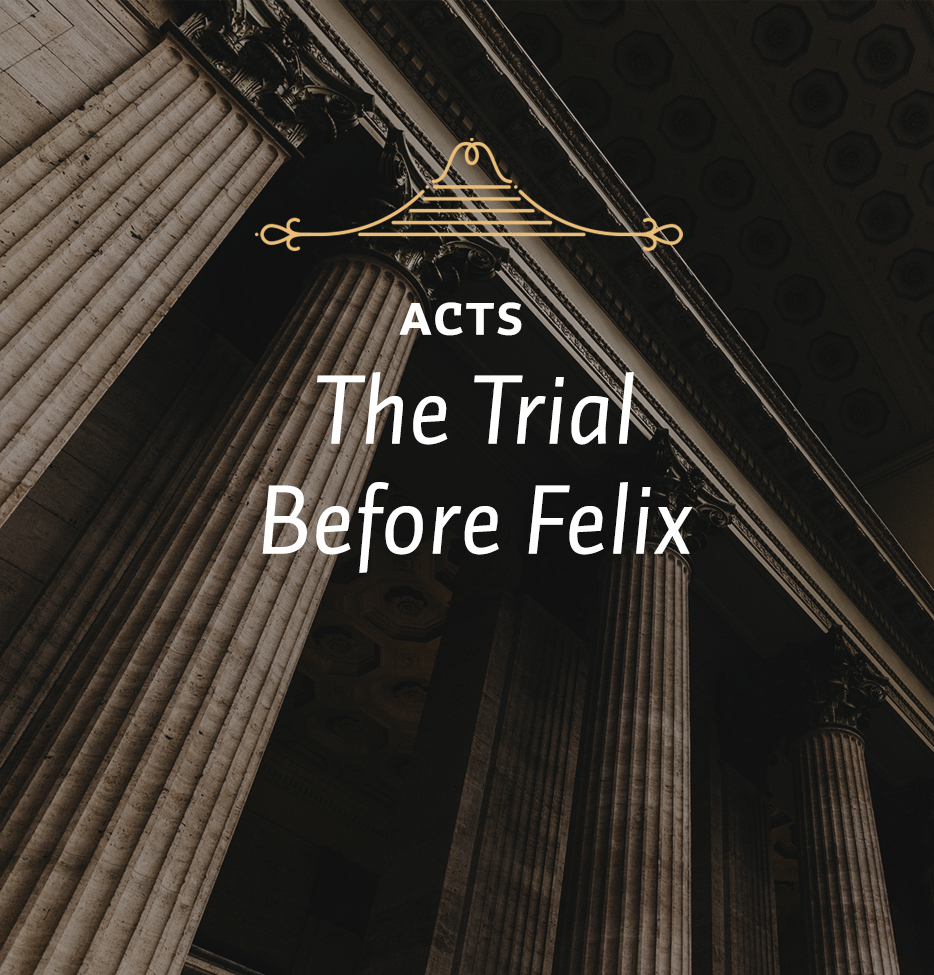The twenty-fourth chapter of Acts contains the account of the apostle Paul’s appearance before Governor Felix.
Paul had finally come to where he was to testify before the rulers of this world. When God sent Ananias to Paul shortly after Paul had seen Jesus on the road to Damascus, He told Ananias, “This man is my chosen instrument to carry my name before the Gentiles and their kings and before the people of Israel” (Acts 9:15). There are three parts to that, and Paul had already fulfilled two of them. He had carried the Gospel to the Gentiles, and he had testified before the Jews. Now he was also to speak before kings. In this chapter, Paul speaks before Felix. In the next chapter, we find him bearing a witness before Felix’s successor, Governor Festus. Then, further on, we find him testifying before King Agrippa. In every case he tells what Jesus had done for him and what he would do for these distinguished rulers.
The circumstances remind us that God moves in mysterious ways, since he had worked in unexpected ways to bring Paul before these kings. Sometimes he moves in equally unexpected ways with us.
Let this be an encouragement. We look at other people and say, “I could bear a great witness if I were in their position, if I had their gifts, if those doors were open to me.” But God has a way of working with people that is unexpected, surprising, and always brings glory to Himself. Never say, “God can’t use me. He can use the others, but He can’t use me.” God is able to use you wherever you are in whatever your circumstances. In case you doubt that, look at the apostle Paul’s case. When he was free, he was a great witness for Jesus; but when he was imprisoned, he was no less a witness, and God blessed him no less, starting with his witness to Felix.
Felix was the Roman governor. He had status, but his background had not been particularly distinguished. He had been a slave, then became a freed man under Claudius. He pandered to the depravity of the emperor and rose in the court until he was finally awarded the governorship of Judah. He was corrupt in his administration and was hated by the Jews. His time as governor was characterized by graft. The wife he married was a teenager whom he stole from another king. Finally, the corruption of his rule became so great that Nero, who was no great model of morality himself, recalled him. He would have been executed if his brother, who was in Rome at the time, had not pleaded on his behalf. This was the man before whom Paul now appeared to give an accounting.1
Five days had passed. During that time the Sanhedrin had gotten their case together and had responded to the invitation to come to Caesarea to press their charges against Paul before the governor. They brought a lawyer with them whose name was Tertullus. Tertullus is a Roman name, but that is all we know about him. People who know the Greek language thoroughly—people like E. M. Blaiklock—say they detect certain Latinisms in his speech (vv. 2-8).2 Blaiklock believes, no doubt rightly, that in Acts we have a Greek translation of a Latin speech. Tertullus was a professional orator, which is what the lawyers of the day tended to be. He had been hired by the Jews to present their case in Caesarea before the Roman governor.
Luke probably gives a condensed form of what was said, just as he has done with other speeches in the book. But if his condensation of Tertullus’ speech reflects the proportions of what this man actually said, we can assume that half of his address was given to flattery of the governor. He said, “We have enjoyed a long period of peace under you, and your foresight has brought about reforms in this nation. Everywhere and in every way, most excellent Felix, we acknowledge this with profound gratitude.” That was sheer hypocrisy, of course. The Sanhedrin did not think that for a moment. They hated this man. And corrupt and vain as he must have been, I suppose that even Felix was shrewd enough to have listened with tongue in cheek. “What is it that these Jewish leaders are after that they should come all the way from Caesarea and flatter me in this fashion?” he must have wondered.
1Everett F. Harrison, Acts: The Expanding Church (Chicago, IL: Moody, 1975), 351, 354; and F. F. Bruce, Commentary on the Book of Acts (Grand Rapids, MI: Eerdmans, 1975), 462.
2E. M. Blaiklock, The Acts of the Apostles: An Historical Commentary (Grand Rapids, MI: Eerdmans, 1963), 179.






